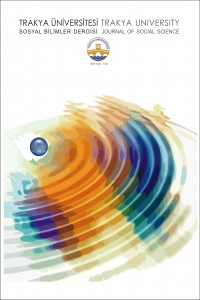Review
Year 2018,
Volume: 20 Issue: 1, 213 - 232, 28.06.2018
Abstract
Günümüz
dünyasında devletleri barış ve güvenliğe katkı sağlamaları için işbirliğine
yönlendiren suçluların geri iadesi hem hukuki bir terim olarak hem de
uluslararası hukukta yasal bir süreç olarak oldukça önemli bir faktör olarak
karşımıza çıkmaktadır. Tüm dünyada ülkeler barış ve güvenliği güçlendirmek
adına suçluların geri iadesi ilkesini mümkün olan en iyi şekilde dizayn etmek için
çabalamakta ve her faili yakalamak, mahkemeye çıkarmak ve cezalandırmak için
yasal mekanizmalarını koordine etmektedirler. Suçluların geri iadesi ilkesi
günümüzde hem Avrupa Birliği hem de AB'ye üye olmak isteyen ülkeler için de,
örneğin Arnavutluk ve Kosova Cumhuriyeti, önemli bir mekanizmadır. Bu
çalışma, öncelikle AB'nin daha sonra da Arnavutluk ve Kosova
Cumhuriyeti'nin suçluların iadesi ilkesi konusunda neler yaptığını, ve süreci
iyileştirmek adına ne gibi mekanizmalar geliştirdiğini analiz etmektedir. ABve
Arnavutluk'tan farklı olarak Kosova örneğinde devletlerin Kosova'yı tanımaması gibi karşılıklı işbirliğini etkileyen 'extra'
engeller bulunmaktadır.
References
- Extradition and Mutual Legal Assistance Handbook Second Edition, Edited by John R W D Jones and Rosemary Davidson.
- An Introduction to International Criminal law and procedure, Robert Cryer, Hakan Friman, Darryl Robinson and Elizabeth Wilmshurst 2007.
- Dr. Salihu, Ismet, E drejta Penale Ndërkombëtare, 2005.
- Dr. Xhafo Jola, E Drejta Penale Ndërkombëtare, Tiranë 2009.
- Mr. Jean Pradel, Mr Gert Vermeulen, Mr geert Corstens, E drejta Penale Evropiane. Përkthyer nga Edmond Xhabija, Valbona Nano, Tiranë 2009.
- Prof.Ass.Dr. Hoxha, Artan,Ekstradition and European Detention Order 2011.
- Prof.Ass.Dr. Hoxha Artan, Halim Islami Ilir dhe Panda, Criminal Procedure 2011.
- Convention Code No. 04 / l-123 of Criminal Procedure of Extradition Paris, December 13, 1957.
- Ministry of Justice of Kosovo.
- Ministry of Justice of Albania.
- Constitution of Republic of Albania (As amended by law nr. 9675, date 13.1.2007; law nr. 9904, date 21.4.2008; and law nr. 88/2012, date 18.9.2012).
- Extradition and European Detention Order 2011.
- Criminal Code of Republic of Albania adopted by the Law Nr.7895, date 27.1.1995.
- Criminal Code of Republic of Kosovo adopted by the Law Nr. 04/L-123.
- Law Nr. 10 193, date 3.12.2009 on the judicial relations with other countries on criminal matters (amended by the law Nr. 100/2013, date 18.3.2013) III Chapter, Section of extradition in Republic of Albania.
- http://legal-dictionary.thefreedictionary.com/extradition
- http://www.balkaninsight.com/en/article/balkan-prosecutors-act-to-ease-dual-citizenship-dilemma
- http://www.cps.gov.uk/
- http://ec.europa.eu/justice/criminal/recognition-decision/european-arrest-warrant/index_en.htm
- International Committee of the Red Cross(CH) https://ihl-databases.icrc.org/
- http://www.prisonersabroad.org.uk/wpcontent/uploads/2015/07/extradition.pdf
- Law no. 04/l-213 on International Legal Cooperation in Criminal Matters Official Gazette of the Republic of Kosovo / no. 33 / 2 September 2013, Pristine
- Ec.europa.eu/justice/criminal/recognition-decision/european-arrest-warrant
Year 2018,
Volume: 20 Issue: 1, 213 - 232, 28.06.2018
Abstract
Extradition
as legal concept as well as legal phenomenon at the international law has been
and is becoming one of the most important aspects to push states cooperates in
order to contribute to peace and security in the world today. As such, it is
broadly known phenomenon in the today’s world. Countries worldwide are going
through serious attempts to consolidate and design it in the best possible
model aiming strengthening of peace and security by coordinating the activities
and mechanism in order to ensure detention, put in trial or suffer the
punishment of each and every perpetrator. Extradition today appears one of the
most important mechanism and instruments within the framework of European
Union. It is also becoming an important mechanism beyond Europe, namely in
countries aspiring to be members of the European Union like Republic of Albania
and Republic of Kosova. Thus this paper attempts to present and analyze the
approaches that, first of all EU is doing and in the following Republic of
Albania and Republic of Kosovo,
institutions are using to improve the process and consolidate the
institute of Extradition, through which an rule of law, respect of human
rights, transparency and democratic life is promoted. Different from the usual
practices at EU level as well as countries like Albania with no contested
statehood, in Kosovo case there are some “extra” obstacles as those of mutual
cooperation between states which are still refusing the recognition of the
country.
Keywords
Extradition Perpetrator Detention Offense Principles Norms Legal Obstacles EU Albania Kosovo
References
- Extradition and Mutual Legal Assistance Handbook Second Edition, Edited by John R W D Jones and Rosemary Davidson.
- An Introduction to International Criminal law and procedure, Robert Cryer, Hakan Friman, Darryl Robinson and Elizabeth Wilmshurst 2007.
- Dr. Salihu, Ismet, E drejta Penale Ndërkombëtare, 2005.
- Dr. Xhafo Jola, E Drejta Penale Ndërkombëtare, Tiranë 2009.
- Mr. Jean Pradel, Mr Gert Vermeulen, Mr geert Corstens, E drejta Penale Evropiane. Përkthyer nga Edmond Xhabija, Valbona Nano, Tiranë 2009.
- Prof.Ass.Dr. Hoxha, Artan,Ekstradition and European Detention Order 2011.
- Prof.Ass.Dr. Hoxha Artan, Halim Islami Ilir dhe Panda, Criminal Procedure 2011.
- Convention Code No. 04 / l-123 of Criminal Procedure of Extradition Paris, December 13, 1957.
- Ministry of Justice of Kosovo.
- Ministry of Justice of Albania.
- Constitution of Republic of Albania (As amended by law nr. 9675, date 13.1.2007; law nr. 9904, date 21.4.2008; and law nr. 88/2012, date 18.9.2012).
- Extradition and European Detention Order 2011.
- Criminal Code of Republic of Albania adopted by the Law Nr.7895, date 27.1.1995.
- Criminal Code of Republic of Kosovo adopted by the Law Nr. 04/L-123.
- Law Nr. 10 193, date 3.12.2009 on the judicial relations with other countries on criminal matters (amended by the law Nr. 100/2013, date 18.3.2013) III Chapter, Section of extradition in Republic of Albania.
- http://legal-dictionary.thefreedictionary.com/extradition
- http://www.balkaninsight.com/en/article/balkan-prosecutors-act-to-ease-dual-citizenship-dilemma
- http://www.cps.gov.uk/
- http://ec.europa.eu/justice/criminal/recognition-decision/european-arrest-warrant/index_en.htm
- International Committee of the Red Cross(CH) https://ihl-databases.icrc.org/
- http://www.prisonersabroad.org.uk/wpcontent/uploads/2015/07/extradition.pdf
- Law no. 04/l-213 on International Legal Cooperation in Criminal Matters Official Gazette of the Republic of Kosovo / no. 33 / 2 September 2013, Pristine
- Ec.europa.eu/justice/criminal/recognition-decision/european-arrest-warrant
There are 23 citations in total.
Details
| Primary Language | English |
|---|---|
| Journal Section | Derleme Makalesi |
| Authors | |
| Publication Date | June 28, 2018 |
| Published in Issue | Year 2018 Volume: 20 Issue: 1 |


